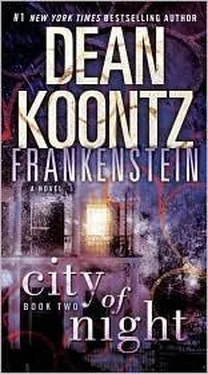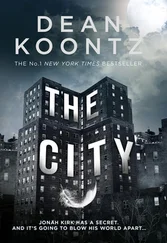When the hand had formed out of the amorphous flesh of Werner’s torso, it had taken hold of Victor’s hand tenderly, beseechingly. But the initial docility dared not be taken as a reliable prediction of a benign transformation.
Nothing remotely like this had ever happened before. Such a sudden collapse of cellular integrity accompanied by self-driven biological reformation should not be possible.
Common sense suggested that such a radical metamorphosis, which must obviously include drastic changes in cerebral tissues, would entail the loss of a significant percentage of the direct-to-brain data and programming that Werner had received in the tank, including perhaps the proscription against killing his maker.
Prudence and responsible haste — not panic — had been required. As a man of unequaled scientific vision, Victor had at once foreseen the worst-case scenario and had acted with admirable calm yet with alacrity to respond to the danger and to contain the threat.
He made a mental note to circulate a stern memo to that effect throughout Mercy before the end of the day.
He would dictate it to Annunciata.
No, he would compose it and distribute it himself, and to hell with Annunciata.
In the monitor room, where Victor gathered with Ripley and four additional staff members, a bank of six rectangular high-definition screens, each displaying the closed-circuit feed from one of six cameras in the isolation chamber, revealed that Werner still remained in a disturbingly plastic condition. At the moment, he had four legs, no arms, and an ill-defined, continuously shifting body out of which thrust a vaguely Wernerlike head.
Highly agitated, the Werner thing jittered around the isolation chamber, mewling like a wounded animal and sometimes saying, “Father? Father? Father? ”
This father business irritated Victor almost beyond the limits of his endurance. He didn’t shout Shut up, shut up, shut up at the screens only because he wished to avoid the necessity of adding a second paragraph to that memo.
He did not want them to think of him as their father. They were not his family; they were his inventions, his fabrications, and most surely his properly. He was their maker, their owner, their master, and even their leader, if they wished to think of him that way, but not their paterfamilias.
The family was a primitive and destructive institution because it put itself above the good of society as a whole. The parent-child relationship was counterrevolutionary and must be eradicated. For his creations, their entire race would be their family, each of them the brother or the sister of all the others, so that no particular relationship would be different from all the others or more special than all the others.
One race, one family, one great humming hive working in unison, without the distractions of individuality and family, could achieve anything to which it set its mind and its bottomless bustling energy, unhampered by childish emotions, freed from all superstition, could conquer any challenge that the universe might hold for it. A dynamic, unstoppable species of heretofore unimagined determination, gathering ever greater momentum, would rush on, rush on, to glory after glory, in his name.
Watching the four-legged, mewling, jittering Werner thing as it began to sprout something like but not like arms from its back, Ripley raised his ridiculous eyebrows and said, “Like Harker.”
Victor at once rebuked him. “This is nothing like Harker. Harker was a singularity. Harker spawned a parasitical second self. Nothing like that is happening to Werner.”
Riveted by the shocking images on the screen, Ripley said, “But, Mr. Helios, sir, he appears to be —”
“Werner is not spawning a parasitical second self,” Victor said tightly. “Werner is experiencing catastrophic cellular metamorphosis. It’s not the same. It is not the same at all. Werner is a different singularity.”
Cindi and Benny Lovewell, one a believer in the science of voodoo and one not, reestablished contact with Detectives O’Connor and Maddison through the signal emitted by the transponder under the hood of their police-department sedan. They caught up with their targets — but remained out of visual contact — in the Garden District.
For long minutes, the cops cruised the same few blocks, around and around, and then changed directions, cruising the identical territory in the opposite direction, making one circuit and then another.
“Like a blind rat in a maze,” Cindi said solemnly, identifying as before with O’Connor’s childlessness.
“No,” Benny disagreed. “This is different.”
“You wouldn’t understand.”
“I have the same capacity for understanding that you do.”
“Not about this, you don’t. You aren’t female.”
“Well, if it’s necessary to have ever had a womb in order to be female, then you aren’t female, either. You don’t have a womb. You were not designed to produce a baby, and you cannot possibly become pregnant.”
“We’ll see what Ibo has to say about that,” she replied smugly. “ Je suis rouge .”
Studying the blinking blip as it moved on the screen, Benny said, “They’re cruising so slow…”
“You want to make contact, block them to the curb, knock ‘em cold, and take them?”
“Not here. This is the kind of neighborhood where people call the police. We’ll end up in a pursuit.” After watching the screen for another minute, he said, “They’re looking for something.”
“For what?”
“How would I know?”
“Too bad Zozo Deslisle isn’t here,” Cindi said. “She has voodoo vision. Give her one look at that screen, and she’d know what they’re up to.”
“I’m wrong,” Benny said. “They aren’t searching. They’ve found what they want, and now they’re casing it.”
“Casing what? Thieves case banks. There aren’t any banks in this neighborhood, only houses.”
As Benny squinted at the screen, feeling an answer teasing along the edge of his mind, the target abruptly accelerated. The red blip hung a U-turn on the screen and started moving fast.
“What’re they doing now?” Cindi asked.
“They’re cops. Maybe they got an emergency call. Stay with them. Don’t let them see us, but try to close to within a block. Maybe we’ll get an opportunity.”
A minute later, Cindi said, “They’re heading for the Quarter. That’s too public for us.”
“Stay with them anyway.”
The detectives didn’t stop in the Quarter. They followed the curve of the river through Faubourg Marigny into the neighborhood known as Bywater.
The blip on the screen stopped moving, and by the time the Lovewells caught up with the plainwrap sedan, in the first orange flush of twilight, it was parked near a church, in front of a two-story brick house. O’Connor and Maddison were nowhere to be seen.
Carson sat across the kitchen table from Lulana St. John, cater-corner to Pastor Kenny Laffite.
Michael stood near the cooktop, where Evangeline was heating a Mason jar frill of milk in a pot of water.
“Heating it directly in a pan,” she told Michael, “you risk scalding it.”
“Then it gets a skin, doesn’t it?” he asked.
She grimaced. “Burnt scum on the bottom and skin on top.”
The minister sat with his arms on the table, staring with horror at his hands. “I just suddenly realized I did it. Just by being me, I killed him. And killing is forbidden .”
“Pastor Laffite,” Carson said, “you are not required by law to answer our questions without your attorney present. Do you want to call your attorney?”
Читать дальше












